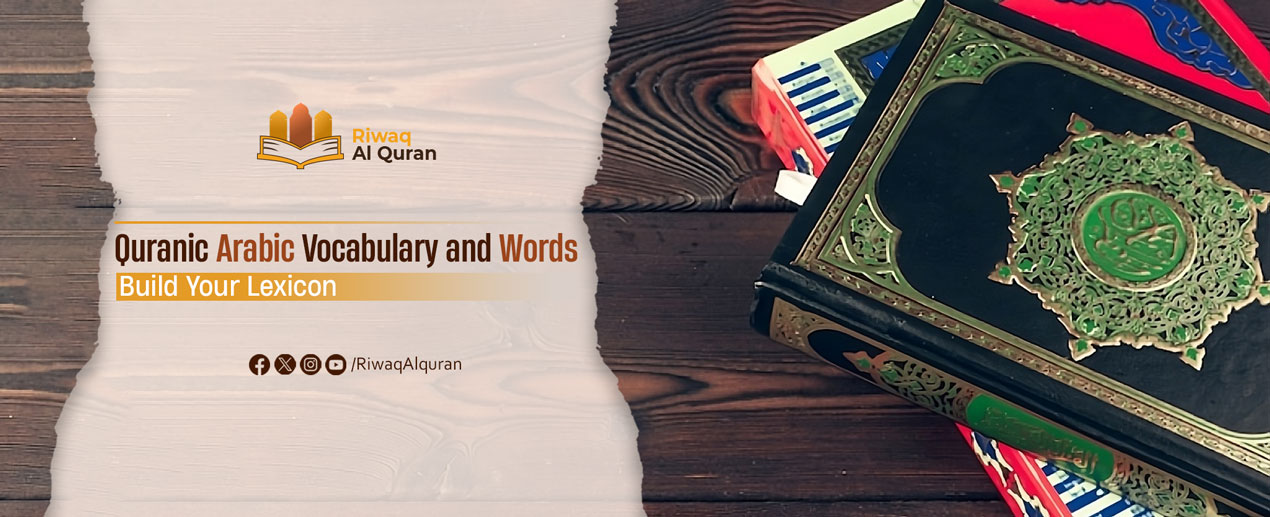Learning the meanings of key Quranic words and their roots, students can enhance their comprehension of the text’s language and thematic connections. Understanding Quranic Arabic words is essential for anyone who wishes to deeply comprehend the messages and teachings of the Quran.
This understanding not only enhances one’s ability to recite the Quran correctly but also brings about a more profound appreciation of its meanings and the wisdom contained within. Let’s explore the importance of learning them and learn many words and roots together!
Table of Contents
Quranic Arabic Words List
Here is a timetable of 50 famous Quranic words with their English meanings, transliterations, and the Surahs and verses where they are mentioned:
| Word | English Meaning | Transliteration | Surah and Verse |
| الله | God | Allāh | Surah Al-Baqarah (2:255) |
| قرآن | Quran | Qur’ān | Surah Al-Baqarah (2:185) |
| إيمان | Faith | ʾĪmān | Surah Al-Baqarah (2:285) |
| رحمة | Mercy | Raḥmah | Surah Al-A’raf (7:56) |
| جنة | Paradise/Garden | Jannah | Surah Al-Baqarah (2:25) |
| نبي | Prophet | Nabī | Surah Al-Baqarah (2:136) |
| صلاة | Prayer | Ṣalāh | Surah Al-Baqarah (2:3) |
| زكاة | Almsgiving/Charity | Zakāh | Surah Al-Baqarah (2:177) |
| صراط | Path/Way | Ṣirāṭ | Surah Al-Fatiha (1:6) |
| كتاب | Book | Kitāb | Surah Al-Baqarah (2:2) |
| عبد | Servant/Slave | ʿAbd | Surah Maryam (19:30) |
| علم | Knowledge | ʿIlm | Surah Al-Baqarah (2:247) |
| حق | Truth/Right | Ḥaqq | Surah Al-Baqarah (2:147) |
| ليل | Night | Layl | Surah Al-Furqan (25:47) |
| يوم | Day | Yawm | Surah Al-Baqarah (2:62) |
| صبر | Patience | Ṣabr | Surah Al-Baqarah (2:153) |
| توبة | Repentance | Tawbah | Surah At-Tawbah (9:104) |
| حمد | Praise | Ḥamd | Surah Al-Fatiha (1:1) |
| أجر | Reward | Ajr | Surah Al-Mutaffifīn (83:36) |
| إسلام | Submission | ʾIslām | Surah Al-Baqarah (2:128) |
| كافر | Disbeliever | Kāfir | Surah Al-Baqarah (2:6) |
| طلاق | Divorce | Ṭalāq | Surah At-Talāq (65:1) |
| سعادة | Happiness | Saʿādah | Surah Al-Hadid (57:10) |
| جهاد | Struggle/Striving | Jihād | Surah Al-Ankabut (29:69) |
| مجاهد | Struggler/Warrior | Mujāhid | Surah Al-Mujādila (58:22) |
| قضاء | Judgment | Qaḍāʾ | Surah Al-Baqarah (2:238) |
| موت | Death | Mūt | Surah Al-Imran (3:185) |
| حياة | Life | Ḥayāh | Surah Al-Baqarah (2:28) |
| إله | Deity | ʾIlāh | Surah Al-Baqarah (2:163) |
| خلق | Creation | Khalaq | Surah Al-Baqarah (2:30) |
| شكر | Gratitude | Shukr | Surah Ibrahim (14:7) |
| صوم | Fasting | Ṣawm | Surah Al-Baqarah (2:183) |
| حرمة | Sanctity/Respect | Ḥurmah | Surah Al-Baqarah (2:178) |
| رحيم | Compassionate | Raḥīm | Surah Al-Fatiha (1:3) |
| قمر | Moon | Qamar | Surah Ya-Sin (36:39) |
| شمس | Sun | Shams | Surah Ya-Sin (36:38) |
| مجرم | Criminal/Transgressor | Mujrim | Surah Al-Ankabut (28:78) |
| بر | Goodness | Birr | Surah Al-Baqarah (2:177) |
| فرد | Individual/Single | Fard | Surah Al-Baqarah (2:286) |
| عقاب | Punishment | ʿIqāb | Surah Al-Baqarah (2:81) |
| عدل | Justice | ʿAdl | Surah An-Nisa (4:40) |
| ميثاق | Covenant/Agreement | Mīthāq | Surah Al-Baqarah (2:40) |
| غفر | Forgiveness | Ghufr | Surah Al-Mumtahina (60:5) |
| بركة | Blessing | Barakah | Surah Al-Baqarah (2:261) |
| فوز | Success/Victory | Fawz | Surah Al-Ankabut (29:9) |
| فضل | Grace/Favor | Faḍl | Surah Al-A’raf (7:96) |
| وصية | Will/Bequest | Waṣiyyah | Surah Al-Baqarah (2:180) |
This table includes a diverse selection of important Quranic words along with their transliterations and references to specific Surahs and verses where they are mentioned.
Read more about Quranic Arabic Vs. The Other Forms Of Arabic (Normal Arabic And Modern Arabic)
Quranic Words Roots
The roots of Quranic words form the basis of Arabic morphology and provide insight into the structure and meaning of the language. Each root consists of a set of consonants that convey a core meaning, which can be modified by adding various prefixes, suffixes, and infixes to form different words.
For example, the root “k-t-b” (كتب) relates to writing. From this root, we get words like “kitab” (كتاب) meaning book, “kataba” (كتب) meaning he wrote, and “maktab” (مكتب) meaning office or desk. By understanding the root, one can deduce the meanings of related words and see how they are interconnected.
Here’s a timetable of 20 Quranic words with their roots, English meanings, transliteration, and the verse and Surah where they were mentioned:
| Word | Root | English Meaning | Transliteration | Surah and Verse |
| نور | ن و ر | Light | Nūr | Surah An-Nur (24:35) |
| رحمة | ر ح م | Mercy | Raḥmah | Surah Al-A’raf (7:56) |
| صراط | ص ر ط | Path/Way | Ṣirāṭ | Surah Al-Fatiha (1:6) |
| علم | ع ل م | Knowledge | ʿIlm | Surah Al-Baqarah (2:247) |
| كتاب | ك ت ب | Book | Kitāb | Surah Al-Baqarah (2:2) |
| عبد | ع ب د | Servant/Slave | ʿAbd | Surah Maryam (19:30) |
| جنة | ج ن ن | Paradise/Garden | Jannah | Surah Al-Baqarah (2:25) |
| حكمة | ح ك م | Wisdom | Ḥikmah | Surah Al-Baqarah (2:269) |
| شمس | ش م س | Sun | Shams | Surah Ya-Sin (36:38) |
| قمر | ق م ر | Moon | Qamar | Surah Ya-Sin (36:39) |
| يوم | ي و م | Day | Yawm | Surah Al-Baqarah (2:62) |
| ليل | ل ي ل | Night | Layl | Surah Al-Furqan (25:47) |
| ملك | م ل ك | King | Malik | Surah Al-Baqarah (2:247) |
| إنسان | ن س ي | Human | Insān | Surah Al-‘Asr (103:2) |
| حق | ح ق ق | Truth/Right | Ḥaqq | Surah Al-Baqarah (2:147) |
| صلاة | ص ل و | Prayer | Ṣalāh | Surah Al-Baqarah (2:3) |
| سماء | س م و | Heaven/Sky | Samāʾ | Surah Al-Baqarah (2:22) |
| ماء | م و ه | Water | Māʾ | Surah Al-Baqarah (2:22) |
| نهر | ن هـ ر | River | Nahr | Surah Muhammad (47:15) |
| أرض | أ ر ض | Earth | Arḍ | Surah Al-Baqarah (2:22) |
Read more about Quranic Arabic Grammar Full Guide


Master Quranic Arabic with Our Comprehensive Course!
Enroll in Riwaq Al Quran’s Quranic Arabic course to master the language of the Quran. Our comprehensive course is designed to build your vocabulary, enhance your understanding of Quranic texts, and deepen your connection to the sacred words.
With experienced instructors and a structured curriculum, you’ll gain the skills needed to interpret and appreciate the Quran’s profound teachings. Join us today and embark on a transformative journey to learn Quranic Arabic!
We offer several courses such as:
- Online courses for kids.
- Online Quran classes for kids and adults.
- Online Arabic courses
- Online Ijazah courses
- Online Islamic Studies courses.
Conclusion
Understanding Quranic Arabic vocabulary is pivotal for anyone seeking a deeper connection with the Quran. By familiarizing yourself with key Quranic words and their roots, you not only enhance your ability to recite and memorize the Quran accurately but also gain valuable insights into its teachings.
The roots of these words provide a foundation for interpreting the text with greater precision, revealing thematic connections and enriching your overall comprehension. This knowledge empowers you to appreciate the Quran’s linguistic beauty and spiritual depth, contributing to a more profound and meaningful engagement with the sacred text. To truly benefit from this rich language, enrolling in a comprehensive Quranic Arabic course, such as those offered by Riwaq Al Quran, can be a transformative step.


































